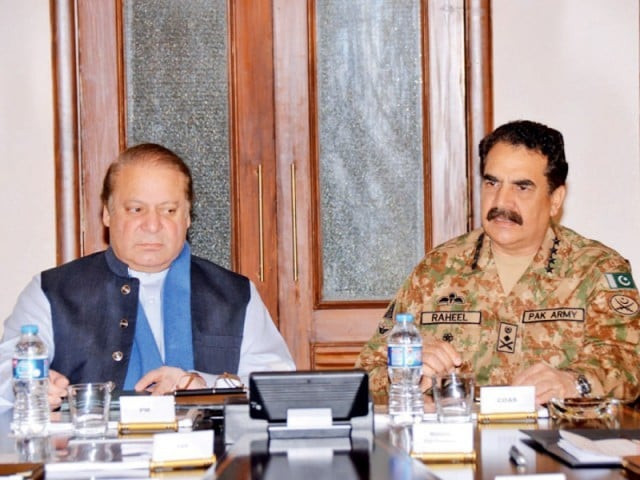The state of civil-military relations
While speculating about the state of civil-military relations, one should keep in mind that we are in a state of war

We are at the same time traversing a transition phase from military rule to the civilian. During this phase, you simply cannot switch off the military and switch on the civilian authority. PHOTO: PID
There is lot to be done yet to bring the crime-infested city of Karachi back to normalcy. But the success the military-backed and the Rangers-led operation has achieved so far is not regarded as insignificant. And it is believed that it is the military’s backing of the operation that has made all the difference. Hence, the heightened speculations with regard to the state of civil-military relations. Many believe a soft coup has already been staged under the cover of the dust kicked up by the Imran-Qadri dharna in August last year. And some others keep whispering about what they call the ‘creeping coup’. Operation Zarb-e-Azb was launched in North Waziristan against both the good and the bad Taliban even before talks between the representatives of the government and the TTP had been officially abandoned as futile. The North Waziristan campaign was owned by the civilian authority only after it had begun and that too seemingly reluctantly generating the impression that it was not deemed necessary to consult the civilian authority before launching the campaign.
Next, we see the Army Chief, General Raheel Sharif, and the new Afghan President, Ashraf Ghani, interacting directly and at an unusually great frequency. In fact, on one of his visits to Pakistan, Afghan President Ghani went to the GHQ for a meeting with General Raheel without first calling on the civilian authorities reinforcing the impression that it is the military that is calling the shots vis-a-vis Pakistan’s Afghan policy. And it was the army chief during his visit last year to the US who had successfully negotiated the resumption of the Coalition Support Fund, which had stopped as per prior agreement on December 31, 2014, the cut-off date for the withdrawal of American troops from Afghanistan. Again, it was General Raheel who while visiting the border region in February, issued a stern warning to the Indians against provocation along the Line of Control and the Working Boundary.
But all said and done, it would be advisable to keep in mind while indulging in speculations about the state of civil-military relations that we are currently in a state of war. We, therefore, at the moment need more of the military’s input in the decision-making process than that of the civilians. We are at the same time traversing a transition phase from military rule to the civilian. During this phase, you simply cannot switch off the military and switch on the civilian authority. It is a long-drawn give-and-take process. The civilians would take their own time in developing capacities to govern and while this is happening, it would need to be business as usual for the army.
Published in The Express Tribune, March 24th, 2015.
Like Opinion & Editorial on Facebook, follow @ETOpEd on Twitter to receive all updates on all our daily pieces.















COMMENTS
Comments are moderated and generally will be posted if they are on-topic and not abusive.
For more information, please see our Comments FAQ